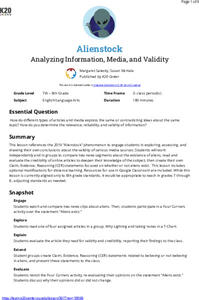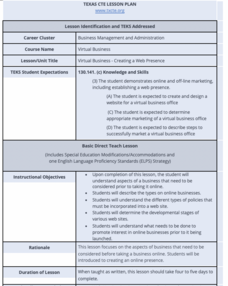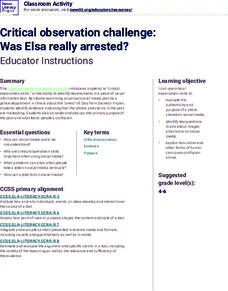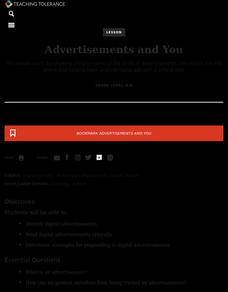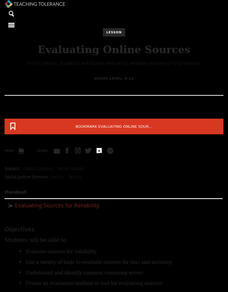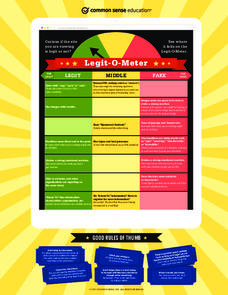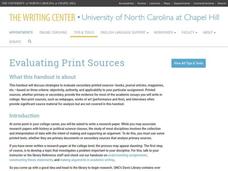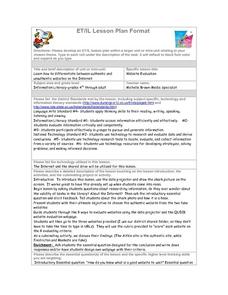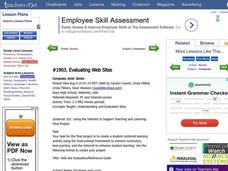California Department of Education
Evaluating Web Sites
If it's on the Internet, it must be true—right? How can someone tell if a website contains less-than-truthful information? Savvy surfers evaluate sources in the fifth of a six-part college and career readiness instructional activity...
Curated OER
Fighting Fake News
Fake news. Alternative facts. Internet trolls. In an age of Newspeak, it's increasingly important to equip 21st century learners with the skills needed to determine the legitimacy of claims put forth on social media, in print, and in...
K20 LEARN
Alienstock: Analyzing Information, Media, And Validity
One only has to watch MSMBC and FOX News to realize that media can present the same story in very different ways. Middle schoolers have an opportunity to test their ability to determine the validity and trustworthiness of information by...
Texas Education Agency (TEA)
Virtual Business - Creating a Web Presence
Using a helpful resource, scholars conduct research to learn about different types and aspects of virtual businesses. They research three company websites, taking notes on what they find appealing about the website design of each.
News Literacy Project
Critical Observation Challenge: Was Elsa Really Arrested?
A 14-slide presentation showcases a social media post featuring Disney's Elsa from the movie, Frozen. The seemingly harmless post received lots of attention, raising the question, how do we know posts are factual? Scholars go through...
Health Smart Virginia
Cyber Tattoo
Designed to inform high school freshmen about the ramifications of sharing personal information through social media, this lesson focuses on sexting. Investigators first check the validity of websites using a Website Evaluation Tool....
Children’s Hospital of Philadelphia
Vaccine Safety
Enter the debate on vaccines. Small groups research topics related to vaccine safety in the last lesson in a unit of five. In the process of the research, team members learn how to determine the validity and credibility of a website. The...
Teaching Tolerance
Advertisements and You
Watch out for clever advertisements! Using the lesson, scholars learn how to identify online ads and respond to them critically. They then use what they've learned to develop a list of strategies to evaluate web pages.
Teaching Tolerance
Evaluating Online Sources
Newspapers, television, social media ... how do people get their news? Using the informative resource, scholars locate and verify credible sources of information. Working in small groups, they discuss strategies for evaluating the...
College Board
Evaluating Sources: How Credible Are They?
How can learners evaluate research sources for authority, accuracy, and credibility? By completing readings, discussions, and graphic organizers, scholars learn how to properly evaluate sources to find credible information. Additionally,...
Common Sense Media
Legit-O-Meter
Pop-ups, banner ads, grammar mistakes ... these are all signs of an untrustworthy website. With the handy Legit-O-Meter poster, scholars can now double-check their sources to ensure accurate, reliable information. The color-coded poster...
iCivics
Step Four: Working with Websites
Almost every profession today relates to websites in some way! The resource tasks the class to fill out three individual graphic organizers to help them analyze each website they visit.
Social Media Toolbox
Social Media Messages
What are the elements of a good social media post? The 13th activity in the 16-part Social Media Toolbox incorporates all of the typical components found in a Facebook or Twitter post. Scholars work together to create great posts based...
University of North Carolina
Evaluating Print Sources
Not all sources are created equal, so how do you evaluate them? Writers learn how to evaluate print sources based on elements such as audience, tone, and argument in the sixth handout of 24 in the Writing the Paper series from the...
Southern Poverty Law Center
Evaluating Online Sources
All sources are pretty much the same, right? If this is how your class views the sources they use for writing or research projects, present them with a media literacy lesson on smart source evaluation. Groups examine several articles,...
Curated OER
Savvy Surfers: Website Evaluation and Media Literacy
Sixth graders strengthen their understanding of what a high quality website is composed of. Learners evaluate three websites for accuracy, credibility, and reliability by completing a chart.
Indiana University Libraries
Web Page Evaluation
Invite your learners to research three different websites that pertain to a topic focused on in your syllabus. Students fill out a chart by answering questions about each site. Then, they compare how useful the sites are to one another....
Curated OER
Who Said That?
Students evaluate website content. They explore various websites, take an online quiz, and complete a "Quality Information Checklist."
Curated OER
A Webpage with Frontpage
Learners design a school webpage. In this webpage design lesson, students use Frontpage software to build a successful, attractive, and informational Web page.
Curated OER
Website Evaluation
Students examine how to differentiate between authentic and unauthentic websites on the Internet. They view and discuss a photo of a shark that is a hoax, then discuss the eight ways to evaluate websites. Students then evaluate three...
Curated OER
Rainforest/Informational Web Sites that are Credible
Fifth graders evaluate whether various rainforest websites are credible and can be used for research purposes. They listen to the story "The Great Kapok Tree," discuss what makes a website credible, and examine and evaluate various...
Curated OER
Evaluating Web Sites
Students examine how to evaluate a website. They discuss a graphic organizer, conduct Internet research, and apply a checklist of criteria to various websites.
Curated OER
Biosecurity Keeps Everyone Safe
Young scholars evaluate websites and determine whether they are valid or invalid resources regarding the topic of infectious diseases and animals. They explore a variety of websites, write a research paper about biosafety, and complete a...
Curated OER
Ethics WebQuest
Young scholars examine the topics of copyright and fair use, plagiarism, and evaluating websites for content. They conduct Internet research, evaluate a variety of websites for authenticity, and write about and define plagiarism and...




